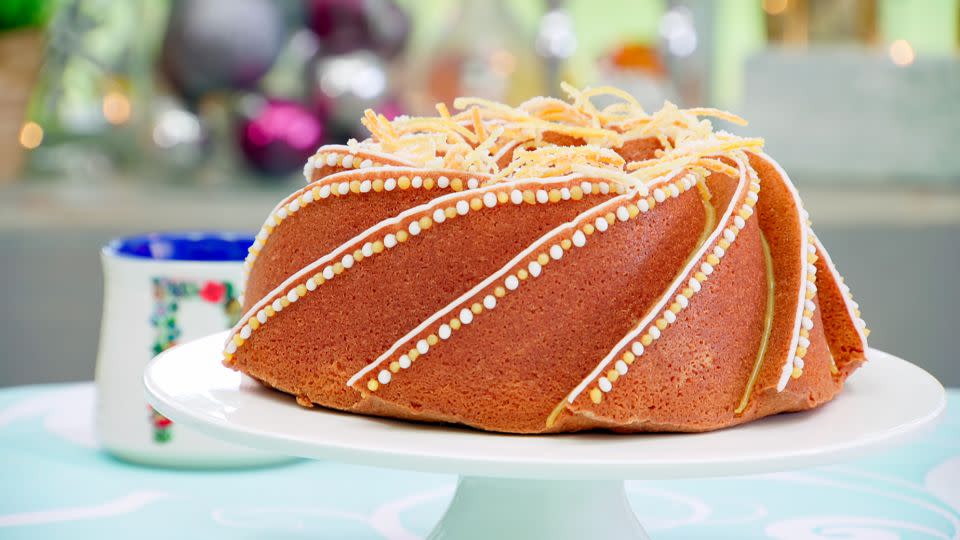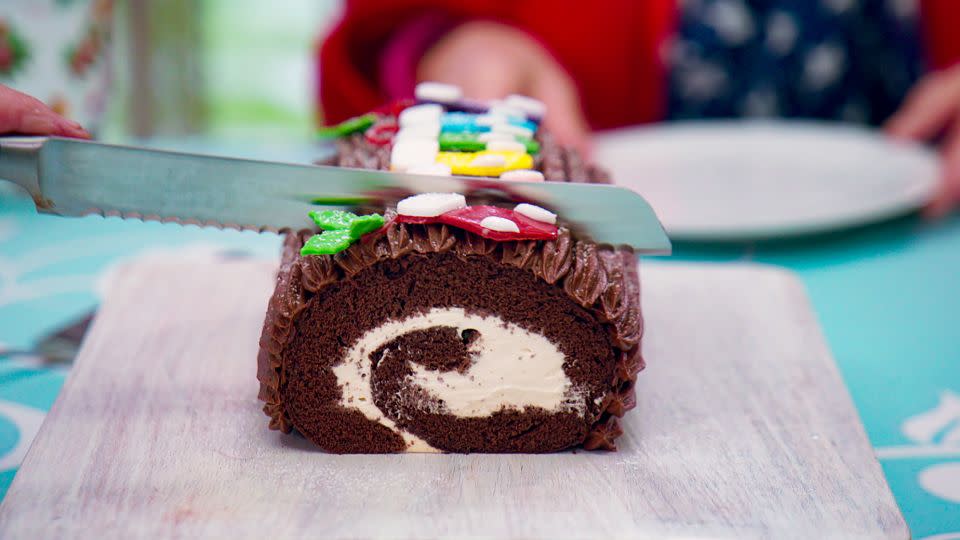Is that ‘Great British Bake Off’ dessert good for you? You may be surprised
Fans of “The Great British Bake Off” will be delighted to learn that a good many of the show’s famous holiday desserts have ingredients that are good for you, according to new research the authors admit was done for fun.
“There are definitely silly components, but methodologically it’s still a rigorous study,” said lead author Joshua Wallach, an assistant professor of epidemiology in the Rollins School of Public Health at Emory University in Atlanta.
Take for example, a recipe for stollen, a German-style fruit bread, from Paul Hollywood, one of the judges for the program, known as “The Great British Baking Show” in the United States. The recipe contains such healthy ingredients as almonds, milk and dried fruits that are linked in studies to a decreased risk of death or disease, research found.
“Overall, without the eggs, butter and sugar, this dessert is essentially a fruit salad with nuts. Yum!” the authors wrote.
Another favorite, Rav’s “frozen” fantasy cake, contained healthy ingredients such as almonds and passion fruit and also “decreased the risk of death or disease,” according to the authors. What’s not considered in the study, however, is the amount of butter, sugar and refined flours the cake might contain.
“If there is any science here, it is science in the service of cheeky fun,” said Dr. David Katz, a specialist in preventive and lifestyle medicine who founded the nonprofit True Health Initiative, a global coalition of experts dedicated to evidence-based lifestyle medicine. He was not involved in the study.
“This analysis in no way considered the net effects of any of these desserts; they simply looked at the isolated effects of ingredients as if they were being eaten in isolation at some level sufficient to exert any appreciable effects at all,” Katz said in an email. “So, I would take this science with a grain of, well, something salutary!”

The authors themselves admit they did not account for the amount of an ingredient: “Any recipe with fruit, even if it was only one berry, was weighted equally in terms of its protective effect in relation to the harmful effect of butter,” they wrote in the study.
Taking the trouble to weigh the amount of an ingredient for its potential harm or benefit “would have been informative, but less fun,” they wrote.
Lighthearted science
The research was published Wednesday in the Christmas issue of The BMJ, known for its precise yet quirky, lighthearted articles and studies. Wallach and his colleagues designed their research for that edition.
“We wanted to highlight the complexities of nutrition research, which often looks at individual foods instead of a complete diet,” Wallach said.
That’s because it’s extremely difficult for researchers to do a gold-standard randomized clinical trial, which would require people to eat only certain foods and no others, he said.
“I think what this paper highlights is that when you look at many of these ingredients individually, some are protective and are harmful. But when you put them together in a recipe, what do we really know? Not much, but that doesn’t really matter. We’re just trying to enjoy a small piece of Christmas dessert, right?”
To do their analysis, Wallach and his colleagues pulled recipes for biscuits, cakes, desserts, pastries and puddings from the website of “The Great British Bake Off.” They took all the ingredients and put them into 17 categories of foods that nutritionists have researched.
The analysis found that while nuts, fruit and coffee were most likely to be associated with protective associations from death and disease, alcohol was the main ingredient group associated with harm.

Because of her penchant for “boozy bakes,” many of the desserts from judge Prue Leith fell into the naughty category, Wallach said.
Leith’s chocolate yule log, for example, would not add to the “festive spirit” because its uncooked cream liqueur would increase a dinner guest’s risk of developing colon, gastric and liver cancer as well as gout and atrial fibrillation, the study said.
“The show often pokes fun at Prue because she self-admittedly talks about how much she likes boozy bakes,” Wallach said. “The contestants often try to win her over by putting a little extra booze in their desserts.
“And the funny part is, in reality, if you’re baking with alcohol, most of it is baked off,” Wallach said. “Anyways, it was a perfect opportunity for us to say, ‘Unfortunately, Prue, alcohol was one thing that was showing up in research as potentially harmful for various health-related outcomes,’ and have a bit of fun.”
A long tradition
Desserts have been key players in Christmas celebrations for hundreds of years, Wallach and his coauthors point out. In medieval England, for example, “the Roman Catholic Church decreed that a pudding should be made on the Sunday approximately four weeks before Christmas,” the study said.
Those puddings were more like healthy stews, with lots of fiber, protein, vitamins and minerals, and with such ingredients as beef, carrots, eggs, figs, grains, mutton, nuts, prunes, raisins and spices, the study said.
Today, however, holiday desserts are often packed with saturated fats, artificial sugars and ultraprocessed, refined flours that studies have linked to having multiple chronic conditions such as diabetes, heart disease and cancer.
Still, unless you eat an entire dessert at one sitting, the amount you consume at the holidays of one or two unhealthy ingredients is likely negligible, Wallach said.
“So, to highlight ‘Look, we’re having a bit of fun with this,’ we say that if you can ignore all of these scientific concerns, you can have your Christmas cake and eat it, too,” he said. “But the ultimate takeaway is enjoying everything in moderation.”
For more CNN news and newsletters create an account at CNN.com